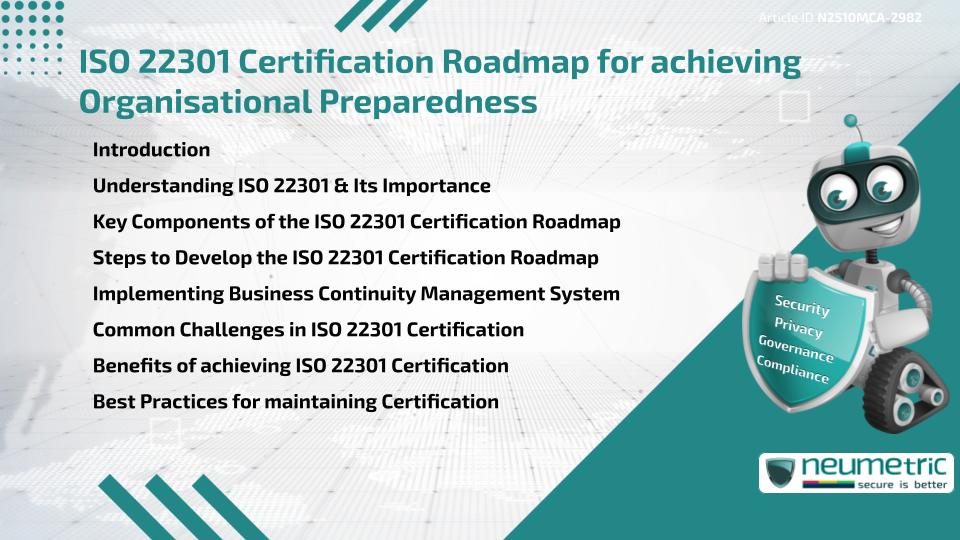Table of Contents
ToggleIntroduction
The ISO 22301 Certification Roadmap provides a structured approach for organisations seeking resilience against disruptions. ISO 22301, also known as the Business Continuity Management System [BCMS], helps organisations prepare, respond & recover from unexpected Incidents such as Cyberattacks, Natural Disasters or Supply Chain failures.
This Roadmap outlines key steps from understanding requirements to implementation, ensuring your organisation builds a robust Continuity Plan. The Certification not only strengthens operational stability but also enhances Stakeholder Confidence & Compliance with international Standards.
For companies aiming for uninterrupted Business Continuity, following the ISO 22301 Certification Roadmap is essential to embed preparedness into every level of the organisation.
Understanding ISO 22301 & Its Importance
ISO 22301 is an international Standard developed by the International organisation for Standardisation to ensure that organisations can continue operating during disruptive events. It establishes a systematic Framework for identifying Risks, prioritising Critical Functions & maintaining Essential Services.
By adopting this standard, organisations can demonstrate their commitment to Resilience & Reliability. A well-designed ISO 22301 Certification Roadmap acts as a bridge between theory & practical execution, enabling organisations to minimise downtime & Financial losses.
Key Components of the ISO 22301 Certification Roadmap
An effective ISO 22301 Certification Roadmap contains the following core components:
- Gap Analysis: Assess current processes against ISO 22301 requirements.
- Risk Assessment: Identify & analyse Potential Threats & Vulnerabilities.
- Business Impact Analysis [BIA]: Prioritise critical activities & resources.
- BCMS Design: Establish Policies, Roles & Responsibilities for Continuity Management.
- Testing & Maintenance: Ensure continual improvement through regular drills & Audits.
Each component serves as a milestone toward Organisational Preparedness & Compliance.
Steps to Develop the ISO 22301 Certification Roadmap
Creating a practical ISO 22301 Certification Roadmap involves several sequential steps:
- Leadership Commitment: Secure management support & allocate necessary resources.
- Define Objectives: Establish clear goals for Business Continuity & Resilience.
- Conduct Gap Analysis: Evaluate current readiness levels.
- Develop BCMS Framework: Create Policies & assign Roles to responsible teams.
- Document Procedures: Maintain Evidence for Audits & Compliance verification.
- Internal Audit & Review: Identify weaknesses before external Certification.
- Apply for Certification: Engage an accredited Certification body to validate Compliance.
Implementing Business Continuity Management System
Implementation requires integrating BCMS practices into daily operations. Staff Awareness programs, Risk Assessments & Incident Response plans must align with the Roadmap.
For instance, conducting regular drills ensures readiness when real disruptions occur. A strong feedback loop between Leadership & Continuity teams guarantees that Corrective Actions are swiftly applied.
Common Challenges in ISO 22301 Certification
Organisations may encounter several challenges during implementation:
- Limited Resources: Smaller entities often face budget constraints.
- Cultural Resistance: Employees may resist new operational changes.
- Inadequate Testing: Lack of scenario-based testing reduces preparedness.
- Documentation Gaps: Missing or inconsistent Records delay Certification.
Understanding these challenges early helps refine the ISO 22301 Certification Roadmap to avoid pitfalls.
Benefits of achieving ISO 22301 Certification
The benefits of following the ISO 22301 Certification Roadmap are extensive:
- Enhanced Operational Resilience.
- Improved Risk Awareness & Crisis Management.
- Increased Trust among Customers & Partners.
- Compliance with global Regulatory Frameworks.
- Competitive advantage in the marketplace.
Organisations with ISO 22301 Certification demonstrate Leadership in Reliability, which can directly influence Business Continuity reputation & Client confidence.
Best Practices for maintaining Certification
After certification, Continuous Improvement is crucial. Organisations should:
- Conduct periodic Audits & Management Reviews.
- Update the BCMS after organisational or environmental changes.
- Maintain consistent Employee Training.
- Review Vendor & Supplier dependencies.
- Document every Incident & Corrective Action.
Ongoing evaluation ensures that the ISO 22301 Certification Roadmap remains relevant & effective.
Takeaways
- The ISO 22301 Certification Roadmap provides a clear path to Organisational Preparedness & Continuity.
- It helps identify Risks, assess Impacts & strengthen Recovery capabilities.
- Leadership commitment & Regular Testing ensure effective implementation.
- Certification boosts Trust, Compliance & Resilience.
- Continuous review & improvement keep the Business Continuity Management System [BCMS] effective & relevant.
FAQ
What is ISO 22301 certification?
It is an international Standard that defines requirements for a Business Continuity Management System [BCMS] to ensure continued operations during disruptions.
How long does ISO 22301 Certification take?
Typically, it takes between six (6) to twelve (12) months depending on organisation size, complexity & current readiness.
Who needs ISO 22301 certification?
Any organisation that wants to prove its resilience & ability to operate under disruptive circumstances can benefit from Certification.
What is the cost of achieving certification?
Costs vary based on factors such as organisational size, scope & Certification body fees.
How often should a BCMS be reviewed?
A BCMS should be reviewed at least annually or whenever there are major organisational changes.
Can ISO 22301 integrate with other Standards?
Yes, it can integrate with ISO 9001, ISO 27001 & ISO 45001 to form a unified management system.
Need help for Security, Privacy, Governance & VAPT?
Neumetric provides organisations the necessary help to achieve their Cybersecurity, Compliance, Governance, Privacy, Certifications & Pentesting needs.
Organisations & Businesses, specifically those which provide SaaS & AI Solutions in the Fintech, BFSI & other regulated sectors, usually need a Cybersecurity Partner for meeting & maintaining the ongoing Security & Privacy needs & requirements of their Enterprise Clients & Privacy conscious Customers.
SOC 2, ISO 27001, ISO 42001, NIST, HIPAA, HECVAT, EU GDPR are some of the Frameworks that are served by Fusion – a SaaS, multimodular, multitenant, centralised, automated, Cybersecurity & Compliance Management system.
Neumetric also provides Expert Services for technical security which covers VAPT for Web Applications, APIs, iOS & Android Mobile Apps, Security Testing for AWS & other Cloud Environments & Cloud Infrastructure & other similar scopes.
Reach out to us by Email or filling out the Contact Form…


